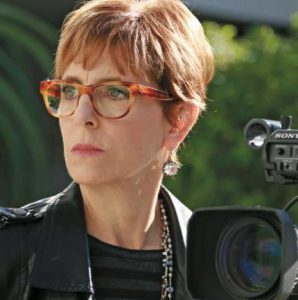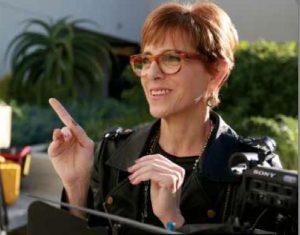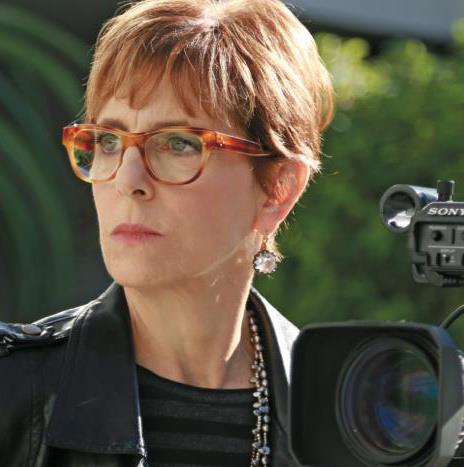by Sariel Friedman
I wanted to interview my mom, who doubles as a pioneering female writer/director, because she is (as cheesy as it sounds), my inspiration. She has been feeding me feminist theory since I was a little girl in the backseat of her car when my friends would blab about how their Prince Charming was going to save them from the wicked witch, and all they had to do was look pretty. In the movie theatre, she would turn to me and ask “now how do you think the story would change if this character were a girl?” As I got older, she introduced me to women I could look up to, when all of the historical figures we studied in school were men. These days, my mom listens to me geek out about what she calls “my career path of the hour” as she reminds me that my chromosomes should not stop me from conquering the world…. even when the rest of the world might not agree. Because of who she is and what she has accomplished in her life so far, I hope she’s not just an inspiration to me, but also to young women everywhere.
inspiration. She has been feeding me feminist theory since I was a little girl in the backseat of her car when my friends would blab about how their Prince Charming was going to save them from the wicked witch, and all they had to do was look pretty. In the movie theatre, she would turn to me and ask “now how do you think the story would change if this character were a girl?” As I got older, she introduced me to women I could look up to, when all of the historical figures we studied in school were men. These days, my mom listens to me geek out about what she calls “my career path of the hour” as she reminds me that my chromosomes should not stop me from conquering the world…. even when the rest of the world might not agree. Because of who she is and what she has accomplished in her life so far, I hope she’s not just an inspiration to me, but also to young women everywhere.
Q: What do you do?
A: I am a writer and director in both film and television. I have been successful in all aspects of the business — directing episodic television, including as the groundbreaking woman hand-picked by Michael Mann to be the first female director of MIAMI VICE and CRIME STORY. I have also directed feature films, as well as writing for both television and features. All of the feature films and television series I’ve created feature strong female leads.
Q: How did you break into the business?
A: I trained as a director at the Yale School of Drama and was given entree into the world of film when I received a grant from the American Film Institute’s Directing Workshop for Women (a program that was designed to develop a qualified pool of female directors when there were very few.) When I hit the “glass ceiling” in the sense that the films I was offered to direct were not challenging or interesting stories, I went back to school and got an MFA in Fiction so that I could write the scripts and television shows I wanted to direct.
Q: Why are there so few female protagonists in mainstream film and TV?
A: The reasons that there are so few female protagonists in film and television are complex, not easily explained, and I think its important to take a nuanced approach to the question. There are historical cycles that need to be taken into account. For example, there was a plethora of strong female characters in the great films of the thirties and forties — think of every character Katherine Hepburn played, Rosalind Russell in HIS GIRL FRIDAY, the great characterizations of Bette Davis, Barbara Stanwyck or Joan Crawford.
Unfortunately what we see now is a studio system that is designed around “tent pole” films, enormous, high-budget films that are usually taken from a comic book, or video game, source with male leads (BATMAN, IRON MAN, SPIDERMAN, TRANSFORMERS, etc.) There is a widespread belief that the primary demographic for these big films are young men age 14 – 26 and that these young men will only go to see films that are aimed at them. This is, in fact, a myth. The truth is that women are responsible for most of the ticket buying, choice of television viewing, and also for most household purchases.
When films with female leads succeed — like THE HUNGER GAMES franchise, for instance — they are still viewed as flukes; but that cycle will change as more female- driven franchises succeed.
We have seen that change dramatically in television, with shows like HOMELAND; THE GOOD WIFE; THE KILLING; REVENGE; NASHVILLE; GIRLS, all of which feature female leads, as do comedy series like 30 ROCK, PARKS & REC; and NEW GIRL.
It’s important to focus on the positive examples and support them with your movie-going dollars and your viewing time. When films and television shows with multi-dimensional female characters succeed and make money, the studios will have a financial incentive to create more of the same.
Q: Why are female characters usually tropes or stereotypes instead of real multi-dimensional human beings?
A: I believe that the primary reason that female characters are two-dimensional is that there are too few female writers and directors. It all starts with the script. I’m not saying that men can’t write multidimensional women, but it isn’t surprising that women can put their own experiences on the page with more depth and accuracy. When I think of great female characters, they are often created by great female writers, and enacted by great actresses: Thelma and Louise was written by Callie Khouri, for example; Erin Brockovich was written by Susannah Grant.
It all starts with the script. I’m not saying that men can’t write multidimensional women, but it isn’t surprising that women can put their own experiences on the page with more depth and accuracy. When I think of great female characters, they are often created by great female writers, and enacted by great actresses: Thelma and Louise was written by Callie Khouri, for example; Erin Brockovich was written by Susannah Grant.
Q: In what ways does the media influence American culture?
A: There is almost no way in which media does not influence American culture; it is both a mirror and a magnifying glass.
Q: Why hasn’t this issue been addressed or even noticed before?
A: I think this issue has been noticed and addressed, but it needs to be addressed continuously until it changes. Change is always incremental.
Q: Has the issue gotten worse or better over the years?
A: I believe that it goes in cycles. In the forties and fifties, there were pioneering female directors – Dorothy Arzner and Ida Lupino. Now there are many more — Kathryn Bigelow, Catherine Hardwicke, Jane Campion, Lynne Ramsey, Andrea Arnold. There aren’t enough and there isn’t yet critical mass; that’s the work that remains to be done.
Q: Do you think that there is still a glass ceiling for women in the film industry?
A: Absolutely. In study after study you can look at the statistics: women make up only 17% of all directors, writers, producers, DPs and editors of feature films. 77% of all dramatic television episodes are directed by white men. The numbers don’t lie.
Q: What advice would you give aspiring female filmmakers?
A: I would quote Eleanor Roosevelt: “No one can make you feel inferior without your consent.” No matter what challenges you face, no matter what sexist actions or remarks are thrown at you, they will only succeed if you allow them to undermine your own confidence. You must remain focussed and tenacious, understanding that the bar is set higher for you as a woman, and that you may well have to work two or three times as hard for less success and less money. Never take anything personally. Always stay laser focussed on the work and keep going, no matter what the challenges. Also make sure you love what you’re doing because you can never create great work when you’re filled with bitterness and anger.
Q: Have you personally experienced sexist discrimination in your career? Please describe.
A: Absolutely — early in my career I was sexually harassed twice by very powerful producers; when I rejected their advances, I was never hired by them again (despite promises they had made to hire me.)
I have been passed over for jobs being told “women can’t direct action” and “women get confused by special effects…” There are producers — both male and female, by the way — who would simply prefer to work with men. That kind of sexism is more subtle and less overt, but just as pervasive.
Q: Why are there so few female directors in Hollywood?
A: As I said, it’s relative; there are more now than in the days of Dorothy Arzner and Ida Lupino, but, in an ideal world, there should be 50/50 parity. Directing, in particularly, is associated with men; the image we have of a male director with a megaphone, jodhpurs and a monocle. A director deals with three things that are generally thought to be the province of men: enormous amounts of money; advanced technology; and leading large groups of people (often male.) It is not dissimilar to leading an army into battle and we still think of our military leaders as male. But there is another way to look at it: directors are also storytellers and nurturers, qualities sometimes thought of as being in the province of women. The truth is that the skills required to be a great director are not the province of either men or women; they do not divide across gender lines. A director needs to be a leader and a nurturer, both decisive and communicative. These are qualities that can come in both male and female packages.
 Q: Do you consider yourself a feminist? Is it a dirty word?
Q: Do you consider yourself a feminist? Is it a dirty word?
A: I am a proud feminist and will never apologize for it. Feminism is about equality, which is good for everyone.
Q: What needs to happen in order to make it easier for women in the film business?
A: The audience must support films by and about women. Women who have been successful have to reach back and hold a hand out to other women, helping the next generation. I always mentor a younger female director on every job I do; I consider it part of my legacy.
Q: Is it solely an American issue?
A: I have noticed that there are more female directors in Europe and Australia. I imagine, on the other hand. that it’s better for women in America, than it is in China or Japan.
Q: Who are your role models?
A: My favorite female director was an almost unknown Russian director named Larisa Schepitko. She made an extraordinary film called THE ASCENT and, unfortunately, she was killed in a car accident when she was in her early thirties. I believe she would have made many brilliant films had she lived longer. I love the muscular work of Kathryn Bigelow and was thrilled when she won the well-deserved Academy Award. I am excited to see her next film — ZERO DARK THIRTY — about the killing of Osama Bin Laden. It is based on copious research and features a young female lead — the intelligence analyst who was, apparently, at the center of the intelligence effort that brought down Bin Laden.
Eleanor Roosevelt, Ruth Bader Ginsburg, Hillary Rodham Clinton, and Elizabeth Warren are role models. I do not just have female role models, however. I admire the work and career of Bernardo Bertolucci and Wim Wenders, among many others.
Q: Do you have any recommendations for movies or shows with awesome leading ladies?
ALIEN, FARGO, THELMA AND LOUISE, OUT OF AFRICA, THE HUNGER GAMES, HIS GIRL FRIDAY, PAT AND MIKE, HOMELAND, THE WIRE, THE GOOD WIFE, MILLION DOLLAR BABY, SILENCE OF THE LAMBS.
Q: Do you think that exposing your body on television or on the big screen is empowering?
A: I believe that what matters is the intent behind exposing your body. Certainly when Jodie Foster played a rape victim in THE ACCUSED, she empowered victims of rape to step into the light and speak out. If a woman is exposing herself just to satisfy the male gaze, it can be undermining to women who want to be seen and acknowledged for all their attributes, not just the physical ones.
